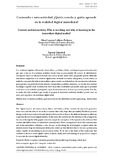Mostrar el registro sencillo del ítem
Contenido e interactividad. ¿Quién enseña y quién aprende en la realidad digital inmediata?
| dc.creator | Caldeiro Pedreira, Mari Carmen | es_ES |
| dc.creator | Aguaded Gómez, Ignacio | es_ES |
| dc.date.accessioned | 2019-06-07T11:00:04Z | |
| dc.date.available | 2019-06-07T11:00:04Z | |
| dc.date.issued | 2017 | |
| dc.identifier.issn | 1853-6530 (Electronic) | |
| dc.identifier.uri | https://hdl.handle.net/2454/33261 | |
| dc.description.abstract | Los «natitantes digitales» (Fernández-García, Blasco y Caldeiro, 2016), constituyen la generación interactiva que nace y vive en el ecosistema mediático donde forja su personalidad. El proceso de alfabetización corresponde tanto a la educación formal como a la no formal, ambas deben prepararlos para las diferentes dimensiones implicadas en el contexto digital actual. Mediante la revisión bibliográfica, en este estudio, se analiza la concepción del adolescente mediático, quien convive con distintas leyes de comunicación audiovisual, prescripciones que pretenden la interrelación comunicativa y mediática. Asimismo, se describe el ecosistema tecnológico español donde el adolescente debe desarrollar su identidad y la mirada crítica que le permitirá convertirse en un ciudadano participativo, capaz de interrelacionarse de forma presencial y virtual. Para ello, en medio del ruido mediático que circula, se propone la formación académica, familiar y social como un arma para empoderar a la ciudadanía digital actual. | es_ES |
| dc.description.abstract | The “digital masters” (Fernández-García, Blasco and Caldeiro, 2016) constitute the interactive generation that is born and who lives in the media ecosystem where they forge their personality. The literacy process belongs to the formal and non-formal education that must form them in the different dimensions which are required in the most recent digital situation. In this sense, this work focuses the attention on the youngest; for this reason through the bibliographic review we analyze the conception of the Spanish media adolescent that coexists with different laws of audiovisual communication. These prescriptions look for the communicative and media interrelation. Attention is also focused on describing the technological ecosystem where the adolescent must forge his identity and develop the critical eye that will allow him to become a participatory citizen, capable of interrelating in person and in virtual. To do this, in the midst of the media noise that circulates in the most recent digital context, academic, family and social training are proposed as a weapon to empower the current digital citizenship. | en |
| dc.format.extent | 14 p. | |
| dc.format.mimetype | application/pdf | en |
| dc.language.iso | spa | en |
| dc.publisher | Universidad Nacional de Córdoba (Argentina) | es_ES |
| dc.relation.ispartof | Virtualidad, Educación y Ciencia, 15 (8), pp. 92-105 | es_ES |
| dc.rights | Creative Commons Atribución – No Comercial – Sin Obra Derivada 4.0 Internacional (CC BY-NC-ND 4.0) | en |
| dc.rights.uri | http://creativecommons.org/licenses/by-nc-nd/4.0/ | |
| dc.subject | Ecosistema mediático | es_ES |
| dc.subject | Generación interactiva | es_ES |
| dc.subject | Alfabetización | es_ES |
| dc.subject | Life long learning | es_ES |
| dc.subject | Mirada crítica | es_ES |
| dc.subject | Media ecosystem | en |
| dc.subject | Interactive generation | en |
| dc.subject | Literacy | en |
| dc.subject | Life-long e-learning | en |
| dc.subject | Critical view | en |
| dc.title | Contenido e interactividad. ¿Quién enseña y quién aprende en la realidad digital inmediata? | es_ES |
| dc.title.alternative | Content and interactivity. Who is teaching and who is learning in the immediate digital reality? | en |
| dc.type | info:eu-repo/semantics/article | en |
| dc.type | Artículo / Artikulua | es |
| dc.contributor.department | Psicología y Pedagogía | es_ES |
| dc.contributor.department | Psikologia eta Pedagogia | eu |
| dc.rights.accessRights | info:eu-repo/semantics/openAccess | en |
| dc.rights.accessRights | Acceso abierto / Sarbide irekia | es |
| dc.type.version | info:eu-repo/semantics/publishedVersion | en |
| dc.type.version | Versión publicada / Argitaratu den bertsioa | es |



